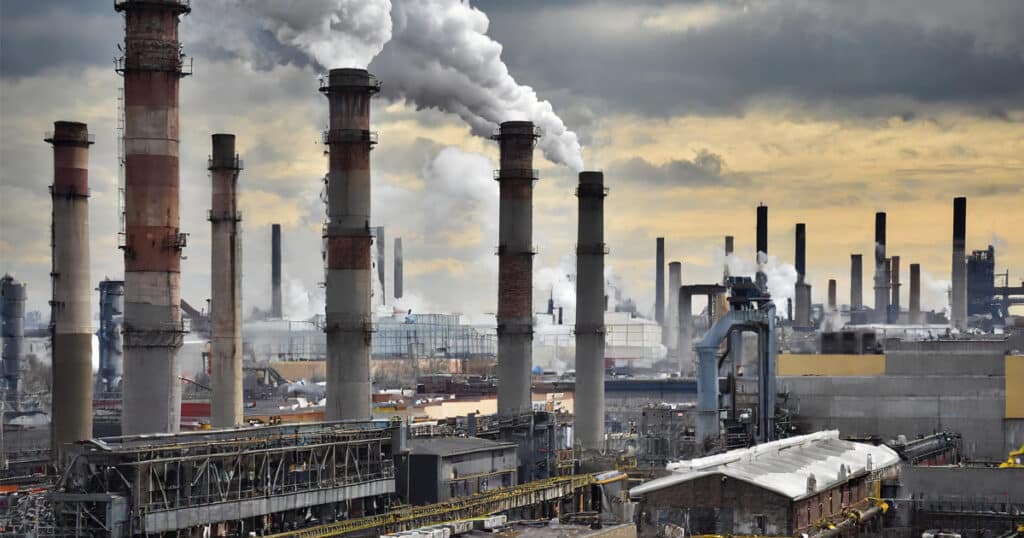
Senate Opens Door to Massive Carbon Tax Despite Critical Economic Concerns
This week, Congress took a step toward passing a carbon tax—an inflationary, regressive tax on all products that would lower economic growth; make all Americans worse off; and disproportionately harm poor people, farmers, and small businesses. Politicians have rightly rejected carbon taxes in the past and should continue to do so.
On Jan. 18, the Senate Environment and Public Works Committee voted to send a proposed law to the full Senate that would require the federal government to conduct a study calculating the carbon emissions of a broad range of different products made in America and other countries. These include construction materials, plastics, and fertilizers—all vital to small businesses and corporations that power the economy.
This study is the first step to imposing a carbon tax on these products. The bill, sponsored by Sens. Kevin Cramer, R-N.D., and Chris Coons, D-Del., is titled the Providing Reliable, Objective, Verifiable Emissions Intensity and Transparency (PROVE IT) Act.
The bill’s proponents say they are responding to carbon taxes in Europe, which will be implemented in 2024. The European Union, which has 21 countries with a carbon tax, is preparing laws to tax imports based on greenhouse gases emitted in their production. This border tax proposal is meant to prevent companies from shifting production outside the EU to avoid carbon taxes.
The complexity of this proposed European legislation, and the pushback from emerging economies, is one reason that it is unwise for America to follow. Europe’s current carbon taxes do not cover carbon emissions from all products. On average, the carbon tax covers 38% of total national carbon emissions, ranging from a high of 81% in Liechtenstein with a rate of $131 per ton to a low of 2% in Spain with a rate of $16 per ton.
In taxing carbon dioxide, Congress would end up reducing energy use while, according to carbon tax proponents, raising revenue that might permit a reduction of income tax rates to compensate. The U.S. Treasury estimated in 2017 that a carbon tax of $49 per ton, rising at 2% a year, would raise $2.2 trillion over 10 years. Such a carbon tax would raise taxes on gasoline by 44 cents per gallon, on natural gas by about $2.60 per thousand cubic feet, on oil by $21.50 per barrel, and on coal by $62 to $126 per ton, depending on its carbon content.
The carbon tax is a favorite of individual economists across the political spectrum for restructuring the tax system. Proponents include Tuft University’s Gilbert Metcalf, American Enterprise Institute scholar Alex Brill, and Donald Marron and Eric Toder of the Tax Policy Center. The Climate Leadership Council, which cleverly refers to the carbon tax as “carbon dividends,” has as its founding members former Federal Reserve Chairman Ben Bernanke, Harvard professors Larry Summers and Greg Mankiw, and Treasury Secretary Janet Yellen (listed on the website as inactive due to her current position).
But a carbon tax has four major disadvantages—it is inflationary and regressive, it causes regional disparities, it is complex, and it drives production offshore. America is stronger without it.
Inflationary and Regressive. One major problem with the carbon tax is that it would raise prices, because all products contain carbon. Inflation is running at almost 4% and has reduced Americans’ real incomes. Since low-income people spend more on energy as a percent of their income than high-income people, a switch to a carbon tax would have to be accompanied by income transfers to low-income groups—i.e., some type of subsidy paid for by taxpayers.
Proponents suggest that offsets, paid for by carbon tax revenues, can be returned to taxpayers through lower income taxes, perhaps with the proceeds going chiefly to poor people who are disproportionately hurt by what is in essence an energy consumption tax. However, Congress rarely cuts one tax by as much as it raises another tax, so Americans will end up paying more in taxes. Further, many poor people are not required to file tax returns, and they would have to do so in order to be identified and compensated. That means extra work for them and for the Internal Revenue Service.
Regional Disparities. Another problem is that carbon-intensive sectors, such as coal, heavy manufacturing, and agriculture, would be the biggest losers under the new tax. This means higher prices for food and gasoline for everyone, especially in rural areas, as well as companies announcing that they are moving offshore. Farmers in Germany, France, the Netherlands, and Belgium are rioting against the new climate provisions.
Complexity. A carbon tax is complex to set up, as can be seen from the PROVE IT Act. The bill selects which products are analyzed and then open to be taxed. Practically all products have some carbon in the content or in the manufacturing process or both, even food and clothing. That is why European carbon taxes range from 2% to 81% of carbon emissions.
Proponents of the tax suggest putting tariffs on imports in proportion to their carbon content so that American companies will not be at a disadvantage. But the precise quantities are complex to calculate, and tariffs might be illegal under World Trade Organization regulations.
Greater Offshore Production Increases Global Emissions. Carbon taxes raise the prices of domestic energy-intensive goods compared to imports from countries without carbon taxes. If American goods were taxed, Americans would prefer to buy cheaper, untaxed imports, and American firms would relocate abroad to avoid the tax or lose business to foreign companies.
This potential relocation reduces the goal of the tax, namely to lower global emissions and global temperatures. It also potentially sends millions of jobs overseas.
With production going abroad to countries with less stringent environmental regulations, global emissions might well rise rather than decline. Without a carbon tax, U.S. carbon emissions declined by 1,000 million metric tons over the past 16 years due to the substitution of natural gas for coal. Other countries do not have America’s inexpensive natural gas and rely more on coal. Therefore, companies relocating overseas would rely on dirtier, coal-produced energy.
A carbon tax would hurt the poor and raise domestic prices relative to the prices of many imports. It would be another add-on levy, with exemptions for political friends and punishments for enemies. The PROVE IT Act is a first step toward the tax, and Congress would be wise to reject the bill.


